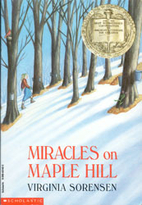Miracles on Maple Hill
by Virginia Sorensen -- Marly's mother used to visit her grandmother on
Maple Hill, where there was all the outdoors to play in, and where you
might say that miracles happen. Now, Marly's mother has inherited the
little house on Maple Hill, and Marly and her family are going to spend
some time there -- weekends, and then the summer -- and Marly is hoping
for a miracle. Her father came home from the war with deep psychological
wounds, and life in their city apartment is not helping him recover.
Maybe at Maple Hill, where there is work to be done in the fresh country
air, their family can come together and be as they once were. Arriving
in the early spring, Marly's family is introduced to the almost magical
(but labor-intensive) process of collecting maple sap and converting it
into syrup. They learn this, and many other useful things about country
life, from their neighbor, Mr. Chris. Are there still miracles on Maple
Hill? Marly is about to find out.
I enjoyed this book for a lot
of reasons. It's what some people think of as a "typical" Newbery
(though there are plenty that break the mold): female protagonist, rich
writing and character development, not a lot of plot. I like that sort
of story if the writing is truly good enough to draw you in, and it
certainly is in this case. However, readers who enjoy a more
action-packed narrative might get impatient with this book, which reads
like a long, leisurely hike through the woods. I also appreciated the
wealth of detail about maple sugaring (a process I have been involved in
at my own grandparents' Pennsylvania farm, so I can attest to the
accuracy of the description) and all of the nature description. The
writing reminded me of Madeleine L'Engle -- perhaps not surprising,
since this is a story from a similar era; only five years separate this
book and A Wrinkle in Time.
(L'Engle usually has a bit more in they way of plot, though, I would
say.) I'm not sure how well or poorly this book handles the depiction of
Marly's father's PTSD, since I don't have a great deal of knowledge on
the subject. I will say, though, that any improvement he saw was not
immediate, but was a slow process, aided, perhaps, by peace and work.
Judging by the year of the book's publication, I'm guessing that the war
her father served in was the Korean War, though I suppose it might have
been WWII. My grandfather served in Korea, so that was another personal
connection I made with this book. It was just the right book for me, so
I would recommend it to readers who like the same sorts of
contemplative, character-driven narratives that I enjoy.
(Reviewed from a copy borrowed through my library system.)

I do love this one! A few students will pick it up. The Joe and Beth Krush illustrations are great.
ReplyDelete